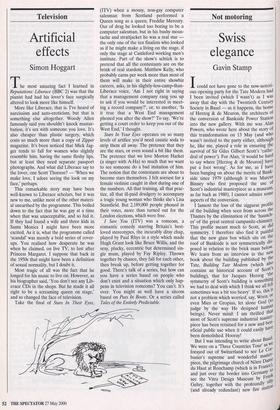Television
Artificial effects
Simon Hoggart
The most amazing fact I learned in Reputations: Liberace (BBC 2) was that the pianist had had his lover's face surgically altered to look more like himself.
More like Liberace, that is. I've heard of narcissism and auto-eroticism, but that is something else altogether. Woody Allen famously said you shouldn't knock mastur- bation, it's sex with someone you love. It's also cheaper than plastic surgery, which costs so much more than a copy of Zipper magazine. It's been noticed that Mick Jag- ger tends to fall for women who slightly resemble him, having the same fleshy lips, but at least they need separate passport photographs. And what did Liberace say to the lover, one Scott Thorson? — 'When we make love, I adore seeing the look on my face,' perhaps.
This remarkable story may have been well-known to Liberace scholars, but it was new to me, unlike most of the other materi- al unearthed by the programme. This boiled down to the fact that he was gay at a time when that was unacceptable, and so hid it. If they had found a wife and three kids in Santa Monica I might have been more excited. As it is, what the programme called `scandal' was merely a bold series of cover- ups. You realised how desperate he was when he claimed, on live TV, to lust after Princess Margaret. I suppose that back in the 1950s that might have been a definition of sexual normality, but I doubt it.
Most tragic of all was the fact that he longed for his music to live on. However, as his biographer said, 'You don't see any Lib- erace CDs in the shops. But he made it all right to be a screaming queen on stage,' and so changed the face of television.
Take the final of Stars In Their Eyes, (ITV) when a mousy, non-gay computer salesman from Scotland performed a Queen song as a queen, Freddie Mercury. Out of drag he looked too boring to be a computer salesman, but in his bushy mous- tache and straitjacket he was a real star the only one of the ten finalists who looked as if he might make a living on the stage, if only the stage at Castleford working men's institute. Part of the show's schtick is to pretend that all the contestants are on the brink of real stardom. Matthew Kelly, who probably earns per week more than most of them will make in their entire showbiz careers, asks, in his slightly-less-camp-than- Liberace voice, 'Am I not right in saying that a management company rang you up to ask if you would be interested in meet- ing a record company?', or, to another, 'Is it true that a West End management phoned you after the show?' To say, 'We're getting a court order to keep you out of the West End,' I thought.
Stars In Your Eyes operates on so many levels of artifice you'd need caustic soda to strip them all away. The pretence that they are the stars, or even sound a bit like them. The pretence that we love Morton Harket (a singer with A-Ha) so much that we want to see someone do a bad imitation of him. The notion that the contestants are about to become stars themselves. I felt sorriest for a female violinist caught in shot during one of the numbers. All that training, all that prac- tice, all that ill-paid drudgery to accompany a tragic young woman who thinks she's Lisa Stansfield. But 2,189,000 people phoned in their votes, more than turned out for the London elections, which were free.
I Saw You (ITV) was a romcom, a romantic comedy starring Britain's best- loved stereotypes, the incurably ditsy chap, played by Paul Rhys in a style which made Hugh Grant look like Bruce Willis, and the sexy, plucky, eccentric but determined sin- gle mum, played by Fay Ripley. Thrown together by chance, they fall for each other, then break up, before getting together for good. There's talk of a series, but how can you have a series based on people who don't exist and a situation which only hap- pens in television romcoms? You can't. It's over. You might as well have a sitcom based on Puss In Boots. Or a series called Tales of the Entirely Predictable.


































































 Previous page
Previous page